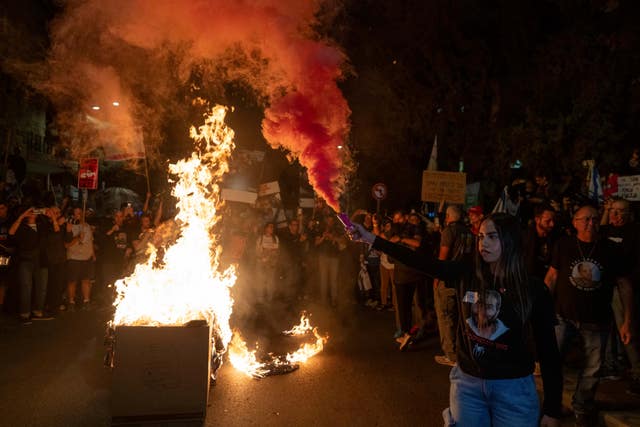
Several large airstrikes have hit Beirut’s southern suburbs, including one on a site adjacent to Lebanon’s only international airport.
The Israeli military had issued an evacuation notice for the site before the strikes early on Thursday, saying there were Hezbollah facilities there and without giving more details.
There were no immediate reports of casualties.

Beirut’s airport has not been directly targeted in the war between Israel and Hezbollah, and national air carrier Middle East Airlines has continued to operate commercial flights.
Meanwhile, the Israeli military has expanded its month-old ground operation in northern Gaza to a town that has been heavily bombed since the earliest days of the war.
The military said in a statement on Thursday that “troops started to operate” in the area of Beit Lahiya after intelligence indicated the presence of militants there.
Hamas has repeatedly regrouped in areas where the military already conducted major operations.
The town in the north-western corner of Gaza was among the first targets of the ground invasion launched over a year ago, after Hamas’ attack into southern Israel.
The northern third of the territory has been encircled by Israeli forces since then.

Israel launched another major offensive in nearby Jabaliya, a decades-old urban refugee camp, in early October.
It has sharply restricted the amount of aid entering northern Gaza and ordered a full evacuation.
Tens of thousands have fled to nearby Gaza City in the latest mass displacement of the war.
Hezbollah leader Naim Kassem said in a speech aired on Wednesday that the Lebanese militant group is open for ceasefire negotiations only once “the enemy stops its aggression”.
His speech marked the 40-day mourning period since former Hezbollah chief Hassan Nasrallah was assassinated in Beirut.


Why are you making commenting on The Herald only available to subscribers?
It should have been a safe space for informed debate, somewhere for readers to discuss issues around the biggest stories of the day, but all too often the below the line comments on most websites have become bogged down by off-topic discussions and abuse.
heraldscotland.com is tackling this problem by allowing only subscribers to comment.
We are doing this to improve the experience for our loyal readers and we believe it will reduce the ability of trolls and troublemakers, who occasionally find their way onto our site, to abuse our journalists and readers. We also hope it will help the comments section fulfil its promise as a part of Scotland's conversation with itself.
We are lucky at The Herald. We are read by an informed, educated readership who can add their knowledge and insights to our stories.
That is invaluable.
We are making the subscriber-only change to support our valued readers, who tell us they don't want the site cluttered up with irrelevant comments, untruths and abuse.
In the past, the journalist’s job was to collect and distribute information to the audience. Technology means that readers can shape a discussion. We look forward to hearing from you on heraldscotland.com
Comments & Moderation
Readers’ comments: You are personally liable for the content of any comments you upload to this website, so please act responsibly. We do not pre-moderate or monitor readers’ comments appearing on our websites, but we do post-moderate in response to complaints we receive or otherwise when a potential problem comes to our attention. You can make a complaint by using the ‘report this post’ link . We may then apply our discretion under the user terms to amend or delete comments.
Post moderation is undertaken full-time 9am-6pm on weekdays, and on a part-time basis outwith those hours.
Read the rules hereLast Updated:
Report this comment Cancel